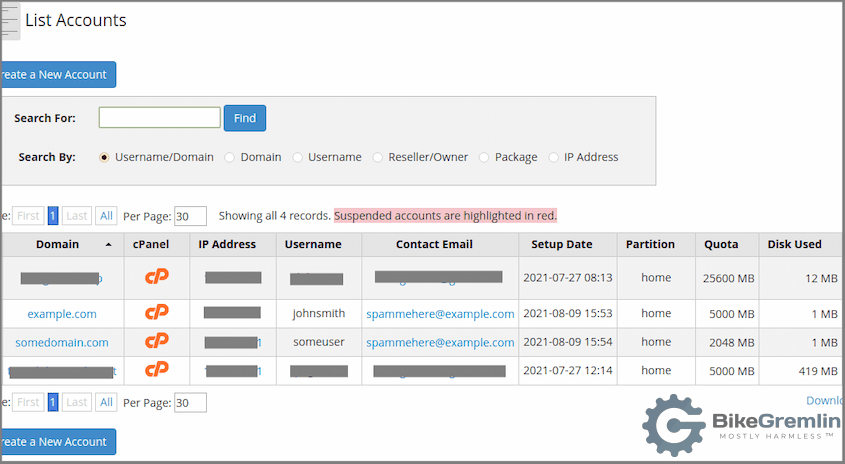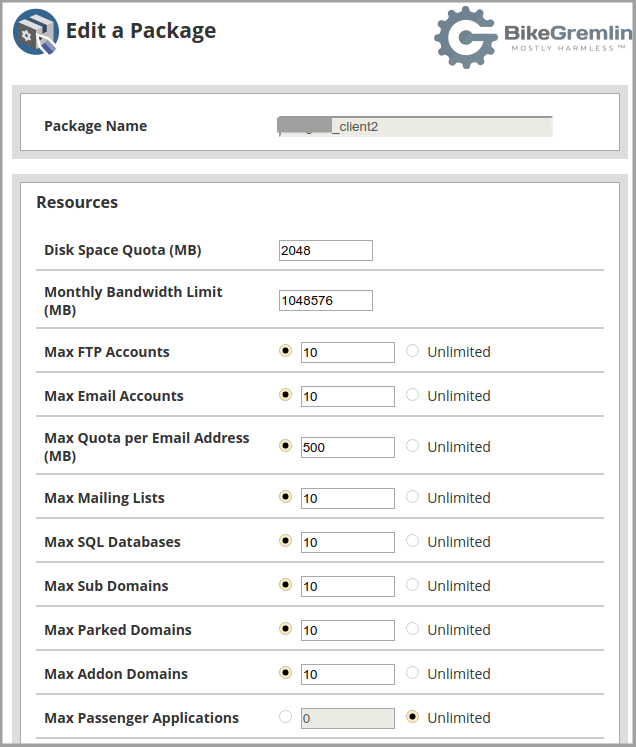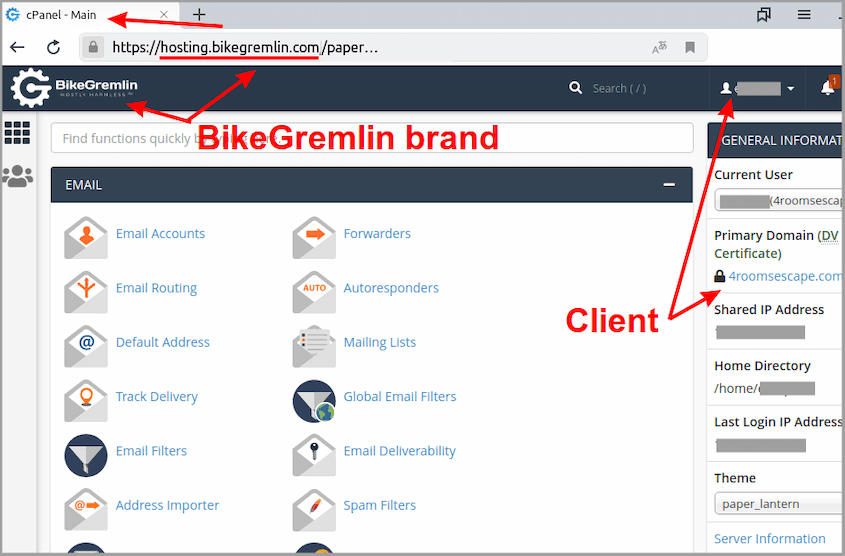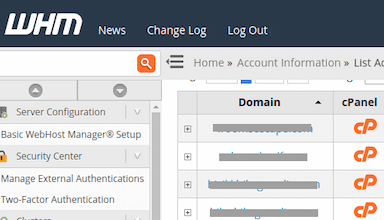In this article I’ll answer these questions:
What is reseller hosting?
How does it differ from shared hosting?
What is it good for and can you make money from it?
Table Of Contents (T.O.C.):
- What is shared hosting?
- What is reseller hosting?
- Reseller vs shared hosting
- What is reseller hosting overselling?
- What is “white label” reseller hosting?
- Can you make money from reseller hosting?
- Master reseller hosting – Pandora’s box
- Conclusion – what’s reseller hosting good for?
- Reseller hosting provider recommendations
1. What is shared hosting?
Once you understand shared hosting, I can explain what reseller hosting is in one sentence. 🙂
In a separate article I’ve nicely explained what shared hosting is. I suggest you read it, then come back here.
If you don’t feel like reading it, here’s a brief explanation: a hosting provider company has a large server, where they place hundreds of customer accounts. When you pay for a shared hosting service, you get one account, with certain available resources (storage, RAM, vCPU cores etc.).
What if you have several websites? In order to prevent problems with one website affecting the other websites, it is a good idea to keep one website per one shared hosting account. This leads us to the next chapter:
2. What is reseller hosting?
Imagine paying a bit more for one “super-account” that enables you to create 10, or 50 shared hosting accounts “under” it. That is reseller hosting.
With a reseller hosting account you usually buy a certain amount of storage space (in GB) and a limited (sometimes unlimited) number of user (shared hosting) accounts you can create.
Picture 1 shows an example of a reseller hosting account with one main reseller account and three created user (shared hosting) accounts (four in total):

Picture 1
See how user “johnsmith” (“example.com” domain) has allotted 5000 MB of storage (“Quota”), while “someuser” (“somedomain.com”) has only 2048 MB?
The provider takes care of server security and maintenance, and you create and delete accounts, and set limits per account:

Picture 2
What you usually can’t edit for user accounts is the available amount of RAM and vCPU cores. The provider sets that per reseller account, for example: 1 GB RAM and 1 vCPU core per created user (shared hosting) account.
More expensive reseller accounts sometimes offer more of these resources for each created user account, like 3 GB RAM and 2 vCPU cores etc, but this is not very common (unfortunately).
Update: from December 2021, MDDhosting offers flexible reseller hosting packages, that let you allocate more, or fewer resources per a sub-account, including the vCPU and RAM, not just storage space. I like it. You can read more about that in my MDDhosting Elastic Reseller hosting review.
3. Reseller vs shared hosting
To explain this, I’ll take Veerotech hosting offer for example. I’ll compare their STARTUP shared hosting with RS0 reseller hosting.
Both packages offer very similar resources per user account, with similar storage space available – around 15 GB (RS0 comes with 20 GB now to be exact).
This website you are reading now takes about 300 MB of storage, while my much larger cycling website takes about 600 MB. That means that 15 GB of storage is enough to store at least 5 websites, comfortably, even if they are large (unless someone uploads a lot of videos on their website, which isn’t very wise, but is a topic for a separate post).
However:
- If I put 5 websites on the STARTUP shared hosting, they will all share 1 vCPU core and 2 GB of RAM.
- Placing those 5 websites on the RS0 reseller account allows me to create a separate shared account for each website, letting each site have 1 vCPU and 2 GB RAM for themselves. Practically providing me with 5 times more important resources.
CPU is often the bottleneck when it comes to WordPress website performance, so this can make a huge difference.
An additional advantage of placing each website on a separate account is security – in case one website gets hacked, the other websites are separated from it and safe.
With this example, in terms of performance and security, I’ll get similar results if I buy 5 STARTUP shared hosting accounts, as I do with one RS0 reseller account.
When it comes to expenses, STARTUP costs 10 $ per month, and RS0 costs 15 $. What is cheaper: 5 x 10, or 1 x 15 dollars? 🙂 This is why reseller hosting has been a great solution for my websites – unrelated to any re-selling to clients.
Access rights:
As a reseller, you have a bit more user privileges compared to an ordinary shared hosting user. Not nearly as much as the server administrator (so you can’t really mess things up 🙂 ), but if you know what you’re doing, the extra rights make some things easier (like configuring automated account backups to remote cloud storage).
Technical support:
High-quality technical support costs a lot. One of the reasons why reseller hosting, per one shared account, costs less than shared hosting is because it is understood that you know the basics (a lot more than an average hosting user) and can offer technical support to your customers, or to yourself if you use reseller for your websites only.
The provider’s technical support will fix any server, or service problems, but don’t expect them to help you with configuring the emails, changing PHP version etc.
This is basically the price you pay for all those resources at a relatively low cost per a shared account.
4. What is reseller hosting overselling?
Many providers state that overselling is enabled or allowed for their reseller hosting packages. What does this mean?
I’ll take the above-noted RS0 reseller hosting package as an example:
- The package comes with 20 GB of storage.
- I know that an average website doesn’t take more than 2 GB of storage.
- 20 GB equals 10 times 2 GB.
Overselling means that with one RS0 account I can create 10 shared hosting user accounts with 5 GB of storage per account. That’s 50 GB in total – a lot more than I have available. But here’s the catch:
I don’t expect all the 10 customers to use all the available storage space (5 GB each) for their websites. To be on the safe side and create a larger margin for error, I can create only 7 shared hosting accounts, instead of 10.
That’s what overselling boils down to. With one note: for smaller reseller accounts with fewer than 50 user accounts allowed (and under 100 GB of storage), it is risky to rely on these stats and is best to avoid overselling. Taking RS0 for example again: it is enough for only 4 users to use almost all of their available 5 GB storage, and I’m in trouble. If you have 60 users, this scenario is a lot less likely. Why? With 60 users on a 100 GB storage, even if 10 of them “go wild” you still have room to spare.
For more details on this, see my article: Overselling vs Overloading.
Important note: hosting server storage space can only be used for website-related files. It can not be used for storing backups, private photos, videos etc. This must clearly be stated if you plan on (re)selling hosting to customers.
5. What is “white label” reseller hosting?
White label reseller hosting allows you to almost completely “hide” the info about which company you bought the hosting from. I.e. you can look almost like a real hosting provider. 🙂
You can place your logo, use your domain nameservers (like ns1.bikegremlin.com, instead of ns1.veerotech.net) etc. Here’s an example:

Picture 3
Is this a good idea? I’ll discuss that in a bit.
6. Can you make money from reseller hosting?
You know, from re-selling it, as the name says. 🙂
Disclaimer: this is my personal opinion, based on my knowledge and experience.
You are not a hosting provider. Nor at least a server administrator. Getting into such a business can be risky because there is a huge number of “moving parts” – something I describe as the “Catch 22 problem” (read that article before you decide to make money with reseller hosting).
It can easily backfire. I use reseller hosting to host websites that I manage, but I try to be up-front with any clients. Stating with which hosting provider and which servers I’m using, explaining clearly what I can and can’t do (what is my responsibility and what I offer for the money).
Remember: you are the technical support for your clients. They will call you if their website is down on a Sunday morning, or if they “aren’t receiving an important email.”
Oh, and do use MXroute for emails, don’t keep them on the hosting server. You’ll thank me for this later. 🙂
7. Master reseller hosting – Pandora’s box
In the previous chapter, I tried to explain some of the risks of re-selling hosting to clients. You understand that I consider such a way of making money to be quite risky (unless you really know what you’re doing)?
Now I’ll talk about the stuff that should be illegal (in my opinion):
- Reseller hosting: John who’s not the hosting provider, nor a server-admin sells shared hosting to a dozen clients.
- Master reseller hosting: Karen sells reseller hosting to John (and to a dozen other people), who then sells shared hosting to clients.
- Alpha reseller hosting: Luke sells master reseller hosting to Karen (and to a dozen other people), who sells reseller hosting to John (and a dozen other people) who then sells shared hosting to a dozen clients.
- Super alpha reseller hosting: Baby panda sells alpha reseller hosting to Luke (and a dozen other people), who sells master reseller hosting to Karen (and a dozen other people), who sells reseller hosting to John (and a dozen other people), who then sells shared hosting to a dozen clients.
A million-dollar question: what happens if there’s a problem with a shared hosting client’s website? 🙂 Would you sleep well knowing your shared hosting is at the end of a master reseller, or a super-duper alpha mega delta reseller hosting chain?

8. Conclusion – what’s reseller hosting good for?
Reseller hosting can be a great and economical choice if you have more than one website. It can also be great for developers, to host client websites, especially if the developers are in charge of website maintenance.
Classic re-selling, acting as a shared hosting provider? Maybe. After years of experience and careful consideration.
If you wish to see what this looks like before buying, there are demo versions available:
- DirectAdmin control panel demo version (with an option to test shared, reseller, or play hosting provider).
- WHM (cPanel) control panel demo version (in this case only with a hosting provider role and rights).
9. Reseller hosting provider recommendations
Based on my personal experience I can recommend a few providers (every link leads to my article explaining the experience in detail – so you can see for yourself whether you like it):
- HostMantis – fast, stable, secure, with a bit of a strange, “fluctuating” business policy (frequent and drastic price raises).
- Gnu Host – excellent technical support.
- Veerotech – premium price, but solid service (these often go hand in hand).

